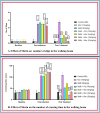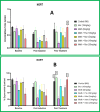Morin Mitigates Methamphetamine-Induced Neurotoxicity: Effects on Motor and Cognitive Function
- PMID: 40524867
- PMCID: PMC12168913
- DOI: 10.2147/JEP.S498984
Morin Mitigates Methamphetamine-Induced Neurotoxicity: Effects on Motor and Cognitive Function
Abstract
Introduction: Neurodegenerative diseases are a major public health concern, often associated with motor and cognitive deficits. Methamphetamine (METH) exposure induces lasting neurological impairment and neuronal loss. This study evaluated Morin's potential to reverse these effects, focusing on motor and cognitive dysfunction in METH-induced neurotoxicity.
Methods: Adult rats were randomly assigned into seven groups, including control, Morin-only, METH-only, METH plus fluoxetine, and three groups receiving METH followed by varying doses of Morin. Following METH induction, Morin, a natural flavonoid with antioxidant properties, was administered to rats. Neurobehavioral tests evaluated motor and cognitive function; serum levels of oxidative stress markers, inflammatory cytokines, dopamine, and acetylcholine were measured. Histological and immunohistochemical analyses of the basal ganglia were performed to evaluate neuronal integrity.
Results: METH exposure significantly elevated oxidative stress and inflammatory markers, altered neurotransmitter levels, and impaired both motor and cognitive performance, coinciding with neuronal loss in the basal ganglia. Treatment with Morin ameliorated these effects in a dose-dependent manner. Neuronal degenerative features noted in the METH-only group were significantly ameliorated in the Morin-treated groups.
Conclusion: These findings indicate that Morin mitigates METH-induced neurotoxicity by reducing oxidative stress, and suppressing inflammation. This study demonstrates Morin's potential as a treatment option for the neurological effects of methamphetamine misuse.
Keywords: Morin; acetylcholine; cognitive function; dopamine; methamphetamine; motor function; neurodegeneration; neurotoxicity.
© 2025 Anyanwu et al.
Conflict of interest statement
The authors report no conflicts of interest in this work.
Figures








References
-
- Fontes Ribeiro C, Silva C, Neves AF, et al. P.1.h.018 Acute methamphetamine exposure induces long-lasting depressive-like behavior in mice. Eur Neuropsychopharmacol. 2013;23:S253. doi: 10.1016/s0924-977x(13)70394-8 - DOI
LinkOut - more resources
Full Text Sources

